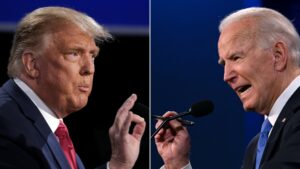Donald Trump, left, and President Joe Biden during the final presidential debate at Belmont University in Nashville, Tennessee, on Oct. 22, 2020.
BRENDAN SMIALOWSKI | AFP | Getty Images
With looming tax law changes slated for after 2025, there’s a lot at stake this election cycle and voters are already seeing plans from President Joe Biden and former President Donald Trump.
After both candidates dominated Super Tuesday contests, the expected rematch may include familiar tax proposals, experts say.
The White House on Thursday released some of Biden’s tax priorities ahead of his State of the Union speech. These include renewed plans to “make the tax system fairer,” with cuts for working families and hikes for the wealthy and large corporations.
More from Personal Finance:
What to expect in Biden’s State of the Union on Social Security, Medicare
What the SEC vote on climate disclosures means for investors
As late payments rise, credit card users face ‘consequences’ from falling behind
“After the election, there’s going to be a major tax debate with trillions of dollars on the table,” said Chuck Marr, vice president for federal tax policy for the Center on Budget and Policy Priorities.
Enacted in 2017, Trump’s signature tax overhaul — known as the Tax Cuts and Jobs Act — included individual tax provisions slated to sunset after 2025.
Without changes from Congress, individuals will see higher federal income tax brackets, a larger standard deduction, a smaller child tax credit and more.
“Whoever is inaugurated on January 20, 2025, is immediately going to confront the need to do something about those expiring tax provisions,” said Howard Gleckman, senior fellow at the Urban-Brookings Tax Policy Center.
If Congress doesn’t act, taxes will increase for the vast majority of U.S. households.
Howard Gleckman
Senior fellow at the Urban-Brookings Tax Policy Center
“If Congress doesn’t act, taxes will increase for the vast majority of U.S. households,” he said. “No politician wants to see that happen.”
However, amid Congressional budget debates, the cost of extending Tax Cuts and Job Act provisions could pose a challenge.
Extending individual tax provisions would increase budget deficits by $2.5 trillion over the baseline from 2024 to 2033, not including debt service costs, according to estimates from the Congressional Budget Office.
Plans to extend individual provisions
While Trump hasn’t shared many specifics for individual tax policy, it’s expected that he wants to make his individual cuts permanent, according to Erica York senior economist and research manager with Tax Foundation’s Center for Federal Tax Policy.
Meanwhile Biden’s fiscal year 2024 budget expressed a desire to extend the individual expirations for those making less than $400,000, she said.
“For 98% of taxpayers, President Biden wants to continue President Trump’s tax cuts,” York said. “The differences come out in what they would do with the rest of the tax code.”

